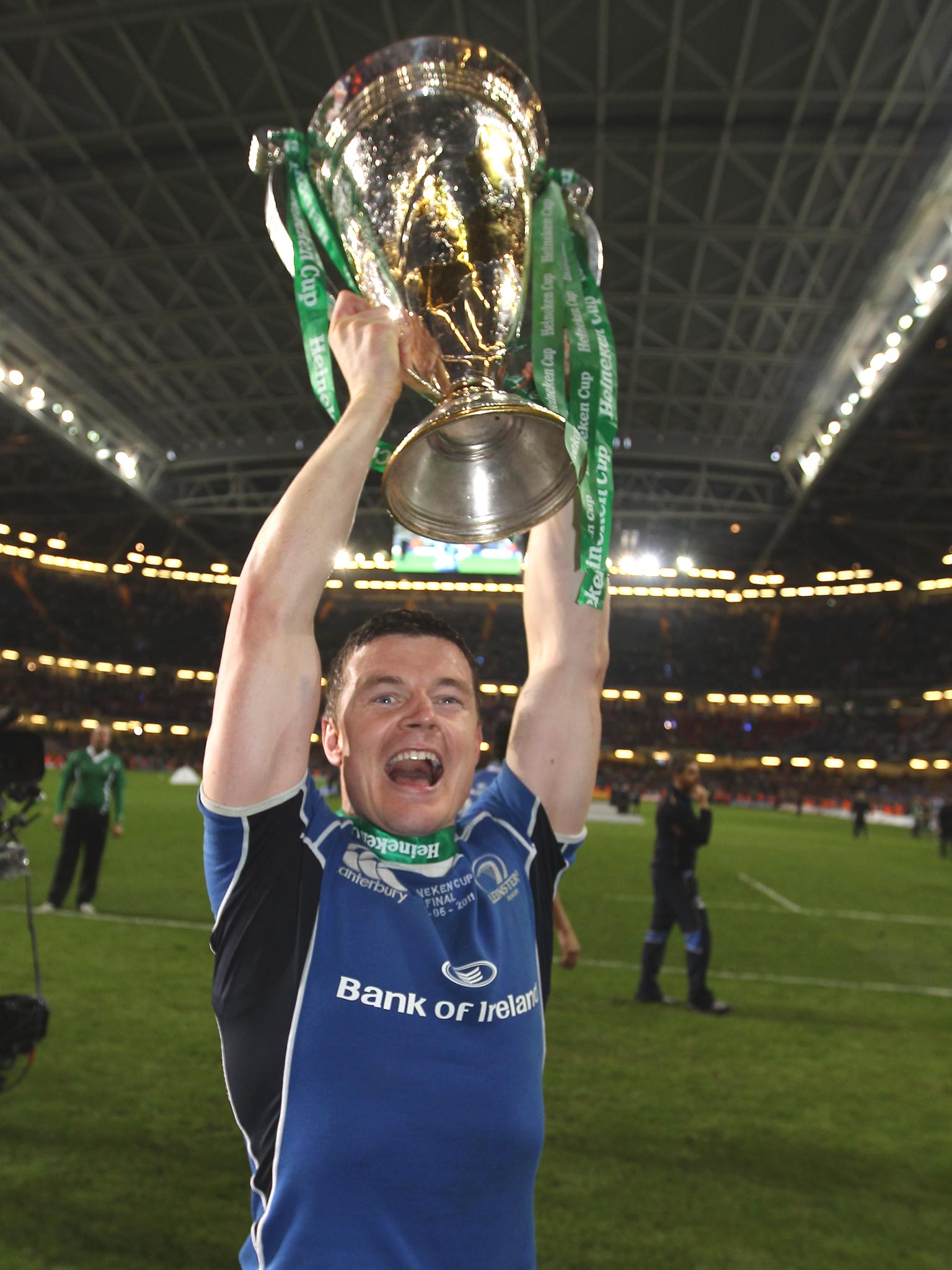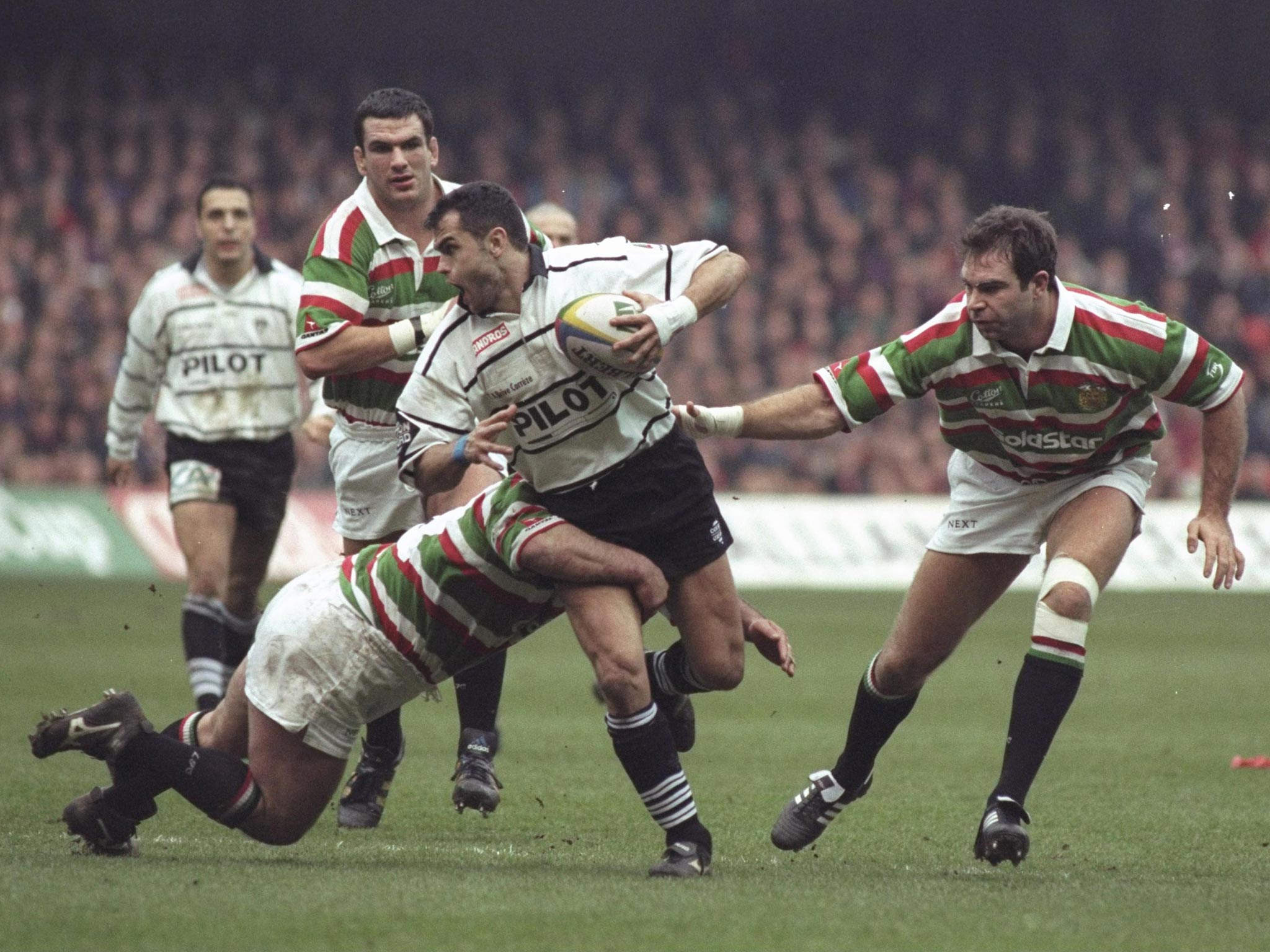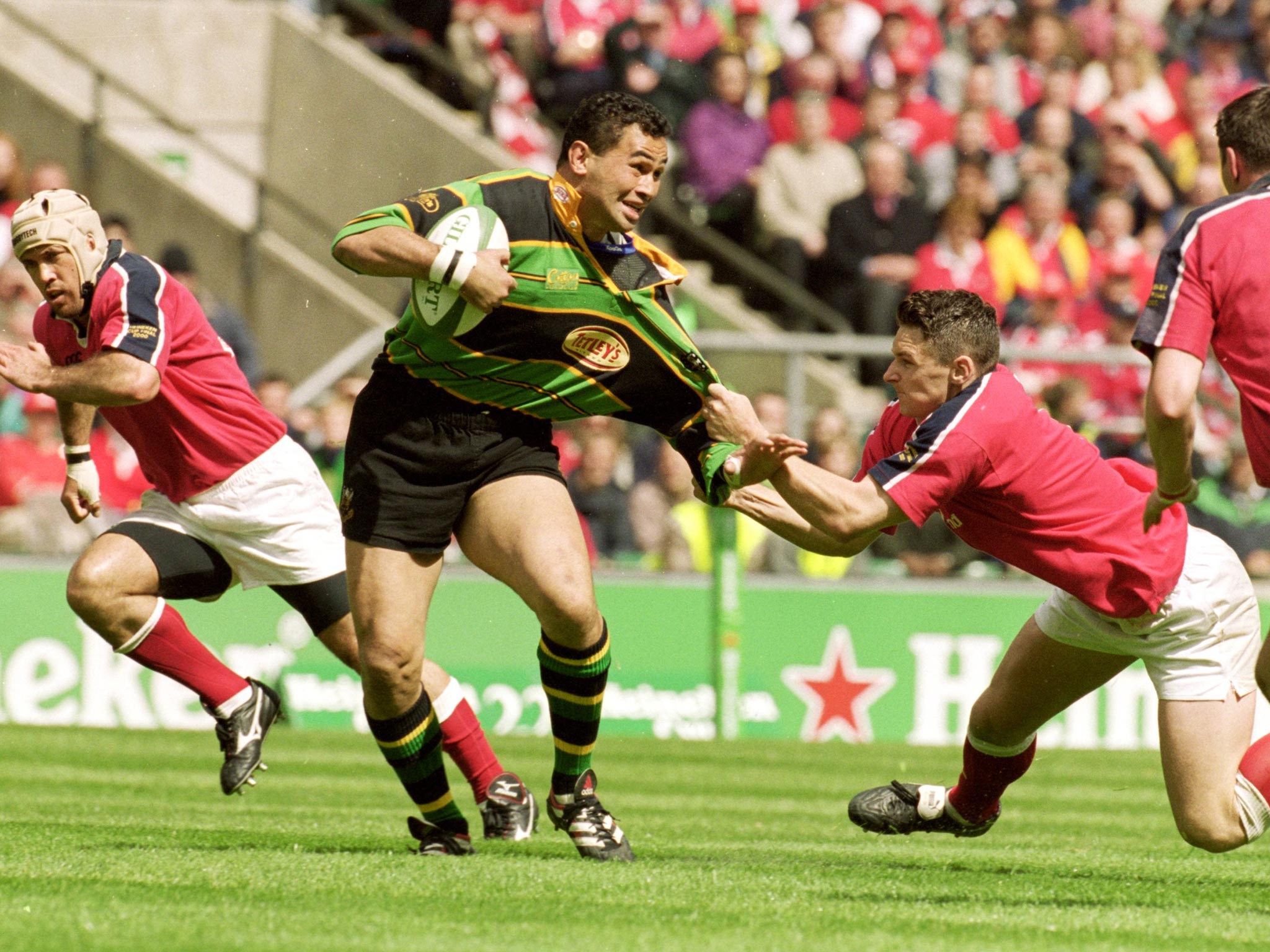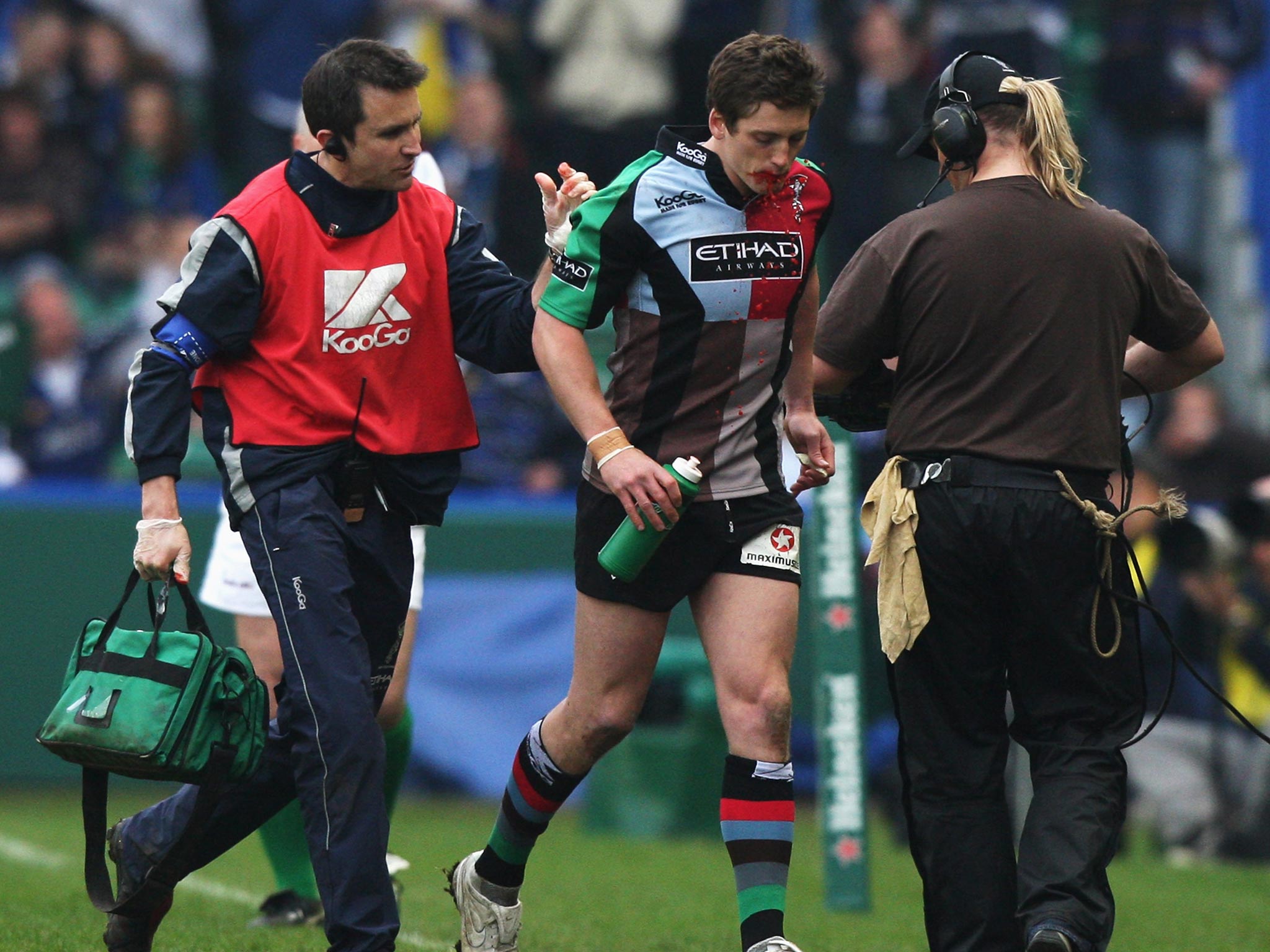Moments that made the Heineken Cup special
On the day of the final final, Chris Hewett looks back at the highlights - and a few lowlights - that remain indelibly in the memory from the past 19 years of European rugby's premier cup competition

Your support helps us to tell the story
From reproductive rights to climate change to Big Tech, The Independent is on the ground when the story is developing. Whether it's investigating the financials of Elon Musk's pro-Trump PAC or producing our latest documentary, 'The A Word', which shines a light on the American women fighting for reproductive rights, we know how important it is to parse out the facts from the messaging.
At such a critical moment in US history, we need reporters on the ground. Your donation allows us to keep sending journalists to speak to both sides of the story.
The Independent is trusted by Americans across the entire political spectrum. And unlike many other quality news outlets, we choose not to lock Americans out of our reporting and analysis with paywalls. We believe quality journalism should be available to everyone, paid for by those who can afford it.
Your support makes all the difference.1995: One day in Constanta
Romania's oldest inhabited city, down on the Black Sea coast, was the unlikely setting for a rugby revolution: the first game in a ground-breaking tournament that so spooked the conservative diehards on the English and Scottish governing bodies that they would have no part of it. Before a crowd of 3,000 or so, Farul Constanta took on the pioneering European spirits of Toulouse and lost heavily – no surprise, given the presence of Émile Ntamack, Thomas Castaignède and Christophe Deylaud in the French champions' back line. Sadly, it was the end of something as well as the start. The Heineken Cup would be a Romania-free zone for the remainder of its existence.
1997: Team from nowhere
Who the hell were Brive? Few people in England had the foggiest idea, so it fell to Leicester to find out. The process of discovery was painful: the Midlanders had big names coming out of their cauliflower ears – Will Greenwood and Austin Healey, Graham Rowntree and Martin Johnson, Neil Back and Dean Richards – but they had no answer to Alain Penaud and company, who won the title with one of the great out-of-left-field performances in modern union history.

1997: 15 rounds at the bar
Brive were quite good at fighting, too, although the boyos from the Welsh valleys had an edge in this department. A few months after winning the trophy, the holders came up against a tough Pontypridd outfit and were taken to the pugilistic limit during the game… and indeed after it. The players reconvened at a local watering hole, Bar Le Toulzac, and pretty much levelled the place. Shocking? Shameful? Undoubtedly. Yet if we're honest, it also strengthened the Heineken Cup's grip on the rugby imagination.
1998: Rugby's Alamo
Brive relinquished their title in Bordeaux later that same season, but only as their final with Bath slipped into stoppage time. Jon Callard's late penalty gave the West Countrymen a victory precious few had seen coming, but the match was won by his besieged forwards, who somehow survived a seven-scrum assault in the most celebrated of goal-line stands.
1998: Rebels with a cause
Before that final, with the politics of the sport in ferment, the English clubs were threatening a boycott in protest at the way the tournament was being run by a union-dominated board. Much to the astonishment of the governing bodies, who had dismissed the talk as so much sabre-rattling, they duly walked out, supported by Cardiff and Swansea, the two biggest clubs in Wales. The competition would survive for another 15 years, but the seeds of its destruction had been sown.
1999: A kangaroo court
Richard Nones, the Colomiers prop, was sent off for gouging Sven Cronk of Pontypridd at an injury-time scrum under lights at Sardis Road. Before leaving the ground, he was hauled before a disciplinary commissioner and banned for two years, despite the absence of video evidence. The French, tapping into a highly developed sense of victimhood, were unconvinced that justice had taken its proper course and allowed him to continue playing at domestic level.
1999: A rare moment in time
Rugby has been largely immune to Irish sectarianism, but it was still quite something to see politicians as diametrically opposed as Gerry Adams and David Trimble attending the same event – and in Dublin, too. The Ulster-Colomiers final was humdrum in terms of the rugby, but the occasion still resonates.
2000: Beyond call of duty
Andy Farrell, the England backs coach, asserts that "no coward ever set foot on a rugby field", but courage comes in different varieties. Pat Lam, who led Northampton to the final, specialised in the full-strength version, flying in the face of medical science to play against Munster at Twickenham with a deconstructed shoulder. He was by no means sure he would survive the first tackle. As it turned out, he absorbed everything the Irishmen could throw at him and ended up lifting the trophy – albeit with a grimace.

2001: Springtime in Paris
One of the great finals. Stade Français, superbly equipped and playing in their own back yard, scored 30 points through the sublime marksmanship of Diego Dominguez, yet could not resist a Leicester side in its pomp. The Tigers scored 34 of their own and touched the heights in the process. Tim Stimpson's improvement of Leon Lloyd's late try from a wickedly wide position took the Midlanders out of Dominguez's range and was as good a kick as it is possible to imagine.
2002: The hand of Hades
Late in a tourniquet-tight final against Munster, the Leicester flanker Neil Back helped his side retain the trophy with an infamous act of "gamesmanship" – the expression of choice for those suspicious of the word "cheat". At a defensive scrum in the closing minutes, he knocked the ball from the hands of the Irish half-back Peter Stringer, thereby pilfering possession. The referee may have been blindsided, but history has taken a clear view. "It tarnished my reputation," Back admitted subsequently.
2003: The skin of their teeth
Munster symbolised the tournament's special spirit and their victory over Gloucester in the "miracle match" at Thomond Park was the stuff of legend. They needed to win by 27 points and score at least four tries to qualify for the knockout stage: it ended 33-6, thanks to an injury-time try from John Kelly – yes, the fourth – and a conversion from Ronan O'Gara, who later claimed he had been unaware of the arithmetic.
2004: Almost too much
England had won the World Cup in dramatic fashion a few weeks previously, so red-rose nerves were already shredded when Wasps travelled to Munster for a mesmerising semi-final more wrenching than anything that had unfolded at the global gathering in Australia. Ten points adrift at the last knockings, the Londoners drew strength from the hostility of the crowd to score late tries through Tom Voyce and Trevor Leota. "You wouldn't rub that off your video, would you?" said Shaun Edwards, their coach. "It's probably the best game I've ever seen."
2004: The dawdle of death
So it was that Wasps met Toulouse in a final that confirmed 2003-04 as a season of gifts. It was decided in their favour when Clément Poitrenaud, the lavishly gifted French full-back, dillied and dallied over a kick ahead from Rob Howley and allowed the Welsh scrum-half to pinch the winning score.
2006: A reluctant ovation
You know you've played well when you put 40 points past Toulouse on their own mudheap and receive a standing ovation from the home crowd. Leinster, with Brian O'Driscoll operating at the peak of his powers, were sensational in this quarter-final at Le Stadium. The Dubliners would lose heavily to Munster in the last four, but this performance marked them out as future champions.
2006: Three-piece sweet
Rupeni Caucaunibuca was the single most extraordinary player of the Noughties. Playing for Agen in a pool match at Gloucester, the Fijian looked as though he had swallowed a sofa and two chairs, so portly was he around the midriff. Patently unfit, he did his best to avoid the ball. When he did stumble across it against his will, he created two tries and bagged a third for himself. Unbelievable.
2008: A maestro at work
Richard Hill was never unfit – not in the Caucau sense, anyway. He was, however, hobbling on one leg when, at the very fag end of his career, the World Cup-winning flanker ignored a ravaged knee joint to run rings round Marty Holah, a fully decorated All Black, and inspire Saracens to an unexpected quarter-final victory over Ospreys. It was the quintessence of rugby know-how.
2009: Fake blood… and gore
A crunch of the teeth, a spurt of actor's crimson, a knowing wink of the eye – and one hell of a scandal. Harlequins' chicanery on quarter-final day against Leinster was beneath contempt, and the attempted cover-up was worse. It still reeks to high heaven.

2009: The English win a penalty shoot-out!
Stuart Pearce, stand aside. Gareth Southgate? Forget about it. If you want to nail a penalty shoot-out, Jordan Crane's your man. Leicester and Cardiff Blues could not be separated in the semi-final, so for the first time a major union match went down the football road with a series of kicks from in front of the sticks. The Tigers' No 8, who had been on West Bromwich Albion's radar as a kid, celebrated his decisive shot with a theatrical yawn.
2011: Mother of all comebacks
By the mid-point of the Northampton-Leinster final in Cardiff, the Premiership club had three tries in the bag and were 22-6 up. The way Jonny Sexton and the mighty O'Driscoll performed after the break, it could have been six tries and 44-6 and still not been enough. The Dubliners turned the world on its head to win 33-22.
2012: We're not bluffing
When the English and French clubs served notice to quit two years ago, the assumption was that something would be sorted: after all, we had been there before in 2007. But this time the Premiership clubs had someone else's money to put where their mouths were, and with BT Sport's millions behind them – not to mention the support of the four Welsh regional teams – they were able to win the important arguments over format, qualification, commercial rights and governance. We are entering a new age. All that is left of the Heineken Cup are memories. Wonderful memories, mostly.
Join our commenting forum
Join thought-provoking conversations, follow other Independent readers and see their replies
0Comments